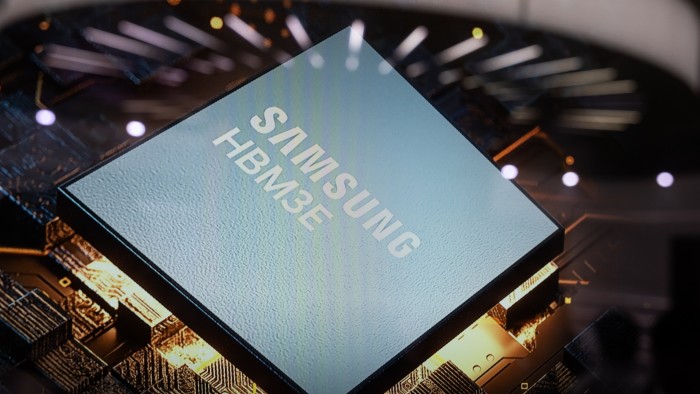Unlock the Editor’s Digest for free
Roula Khalaf, Editor of the FT, selects her favourite stories in this weekly newsletter.
Samsung has turned to Chinese technology groups to prop up its ailing semiconductor division, as it struggles to secure big US customers despite investing tens of billions of dollars in its American manufacturing facilities.
The South Korean electronics group revealed last month that the value of its exports to China jumped 54 per cent between 2023 and 2024, as Chinese companies rush to secure stockpiles of advanced artificial intelligence chips in the face of increasingly restrictive US export controls.
In one previously unreported deal, Samsung last year sold more than three years’ supply of logic dies — a key component in manufacturing AI chips — to Kunlun, the semiconductor design subsidiary of Chinese tech group Baidu, according to people familiar with the matter.
But the increasing importance of its China sales to Samsung comes as it navigates growing trade tensions between Washington and Beijing over the development of sensitive technologies.
The South Korean tech giant announced last year that it was making a $40bn investment in expanding its advanced chip manufacturing and packaging facilities in Texas, boosted by up to $6.4bn in federal subsidies.
But Samsung’s contract chipmaking business has struggled to secure big US customers, bleeding market share to Taiwan Semiconductor Manufacturing Co, which is investing “at least” $100bn in chip fabrication plants in Arizona.
“Samsung and China need each other,” said CW Chung, joint head of Apac equity research at Nomura. “Chinese customers have become more important for Samsung, but it won’t be easy to do business together.”
Samsung has also fallen behind local rival SK Hynix in the booming market for “high bandwidth memory”, another crucial component in AI chips. As the leading supplier of HBMs for use by Nvidia, SK Hynix’s quarterly operating profit last year surpassed that of Samsung for the first time in the two companies’ history.
“Chinese companies don’t even have a chance to buy SK Hynix’s HBM because the supply is all bought out by the leading AI chip producers like Nvidia, AMD, Intel and Broadcom,” said Jimmy Goodrich, senior adviser for technology analysis to the Rand Corporation research institute.
“What Samsung is producing are the scraps that are inferior but still good enough for the Chinese, as there is no local HBM substitute yet.”
According to the consultancy SemiAnalysis, Samsung is the “biggest supplier of HBM into China”, which is used in Huawei’s Ascend 910 series of AI chips.
The South Korean group’s contract chipmaking business also partnered with Kunlun to produce the Core P800, an AI chip released in February that also incorporates Samsung HBM.
A person familiar with Samsung’s thinking said it had hoped to work with Kunlun to produce an even more advanced AI chip, but the project had been put on hold because of new US restrictions that came into force in January.
The curbs, which cap the permitted performance of AI chips produced for Chinese customers by foreign foundries, were tightened after TSMC acknowledged last year it had mistakenly assembled AI chips for shell companies acting on Huawei’s behalf.
“Our business with Baidu has become uncertain since stronger US export controls took effect in January,” said a person close to Samsung, who added it was seeking more leeway from US authorities.
Goodrich stressed there was no suggestion that Samsung had violated US regulations on producing AI chips for Kunlun, or supplying the Baidu subsidiary with logic dies “as the performance of those chips is unknown”.
But he noted the restrictions meant that Chinese companies “will take anything they can get, either in terms of HBM or logic foundry capabilities, as Chinese indigenous players are not yet as competitive”.
He added that “Samsung producing what may be a very competitive chip for Baidu raises questions as to whether the performance thresholds of US restrictions need to be adjusted — the longer US officials wait, the more of these chips are going to be produced for China”.
Samsung said it “strictly complies with the export regulations set forth by the US government. We are unable to comment on our customer relationships”.
Source link









